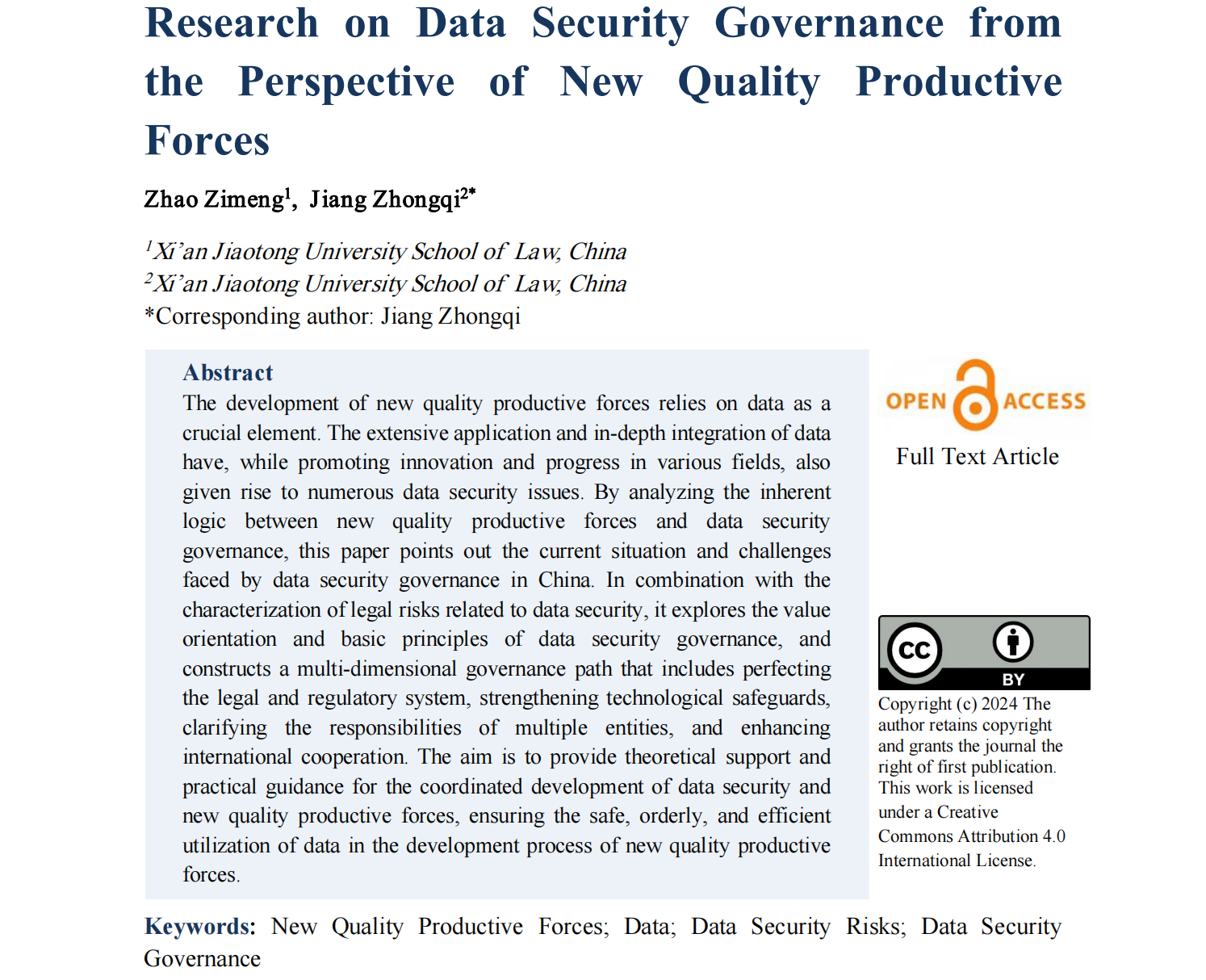Research on Data Security Governance from the Perspective of New Quality Productive Forces
Keywords:
New Quality Productive Forces, Data, Data Security Risks, Data Security GovernanceAbstract
The development of new quality productive forces relies on data as a crucial element. The extensive application and in-depth integration of data have, while promoting innovation and progress in various fields, also given rise to numerous data security issues. By analyzing the inherent logic between new quality productive forces and data security governance, this paper points out the current situation and challenges faced by data security governance in China. In combination with the characterization of legal risks related to data security, it explores the value orientation and basic principles of data security governance, and constructs a multi-dimensional governance path that includes perfecting the legal and regulatory system, strengthening technological safeguards, clarifying the responsibilities of multiple entities, and enhancing international cooperation. The aim is to provide theoretical support and practical guidance for the coordinated development of data security and new quality productive forces, ensuring the safe, orderly, and efficient utilization of data in the development process of new quality productive forces.
References
[1]WEI Xiangjian, HUANG Xinye, XIAO Luyuan. Auditing for data security governance in the perspective of new quality productivity development[J]. Auditing Research, 2024, (05):45-52.
[2]Cao Pantian, Yuan Ruijing. Preventive Governance of Data Security Risks in Overseas Listing of Enterprises[J]. Hebei Journal, 2023, 43(03):203-210.
[3]LIN Wei. Artificial Intelligence Data Security Risks and Countermeasures[J]. Journal of Intelligence, 2022, 41(10):105-111+88.
[4]JIANG Luyuan, CAO Limei, QIN Xin, et al. Fairness perception in artificial intelligence decision making[J]. Advances in Psychological Science, 2022, 30(05):1078-1092.
[5]Mei Y. Research on Data Security Situation and Protection[J]. Network Security Technology and Application, 2024, (11):51-54.
[6]Kuang Boyu, Zhang Zhaobo, Yang Shanquan, et al. HMFuzzer: A human-computer collaboration-based firmware vulnerability mining scheme for IoT devices[J]. Journal of Computing, 2024, 47(03):703-716.
[7]Qian Linye. Autonomous driving data security risk and legal protection[J]. China Informatisation, 2023, (04):65-67.
[8]SONG Sijia, SAN Chenlu, WANG Shuang, et al. Research on the privacy of genetic data and the progress of related protection technology[J]. Journal of Medical Informatics, 2021, 42(06):2-9+23.
[9]Dongfang. Comparative analysis of legal regulation of cross-border data flow in the EU and the United States and ‘Chinese wisdom’ to cope with the challenges[J]. Library Journal, 2019, 38(12):92-97+104.
[10]Chen B, Fu SG. Commercial utilisation of public data: market value, competitive rationale and promotion of rule of law[J]. Journal of Beijing Administrative College, 2024, (05):96-105.
[11]YIN Zhiwei, HE Xin, WANG Zhao. Analysis of generic data classification and hierarchical protection strategy in enterprise information lifecycle management[J]. Electronic Technology, 2024, 53(03):398-401.
[12]ZHANG Wenxi, YIN Wenhao, HU Xiaoyao, et al. Exploration of security protection system based on the whole life cycle of data[J]. Software, 2024, 45(08):169-171.
[13]Yang Zhiqiong. Challenges and Responses to the Criminal Law System of Data Crimes in China in the Era of Digital Economy[J]. China Jurisprudence, 2023, (01):124-141.
[14]Li Huaisheng. Adjustment of Criminal Law on the Crime of Infringing Citizen’s Personal Information - Background of Citizen’s Personal Information Protection Law[J]. Journal of China University of Political Science and Law, 2022, (01):138-148.
[15]Liu Linlin. Research on Data Security Risk Prevention System in the Era of Artificial Intelligence[J]. Journal of Politics and Law, 2024, 41(03):32-41.
[16]Dong Muxin, Xu Yude. Data Security and Governance Path in Digital Transformation of State-owned Enterprises - Based on Information Ecology Perspective[J]. Finance and Accounting Monthly, 2022, (13):132-136.
[17]Ma Qijia, Liu Feihu. Exploration of National Security Governance in Data Exit[J]. Theory Exploration, 2022, (02):105-113.
[18]MA Guanghua, GAO Gao Liang,MA Chenhui. Research on Commercial Data Security Risk Prevention Based on Machine Learning[J]. Journal of Management, 2023, 36(01):70-83.
[19]Tang, Lin-Yao. Risk Regulation and Jurisprudence Construction of Data Compliance Technology[J]. Oriental Law Journal, 2022, (01):79-93.
[20]Li Huaisheng. Data life cycle security risk and its criminal law response path[J]. Journal of Soochow University (Philosophy and Social Science Edition), 2023, 44(03):74-85.

Downloads
Published
How to Cite
Issue
Section
License
Copyright (c) 2024 Zimeng Zhao, Zhongqi Jiang

This work is licensed under a Creative Commons Attribution 4.0 International License.






















